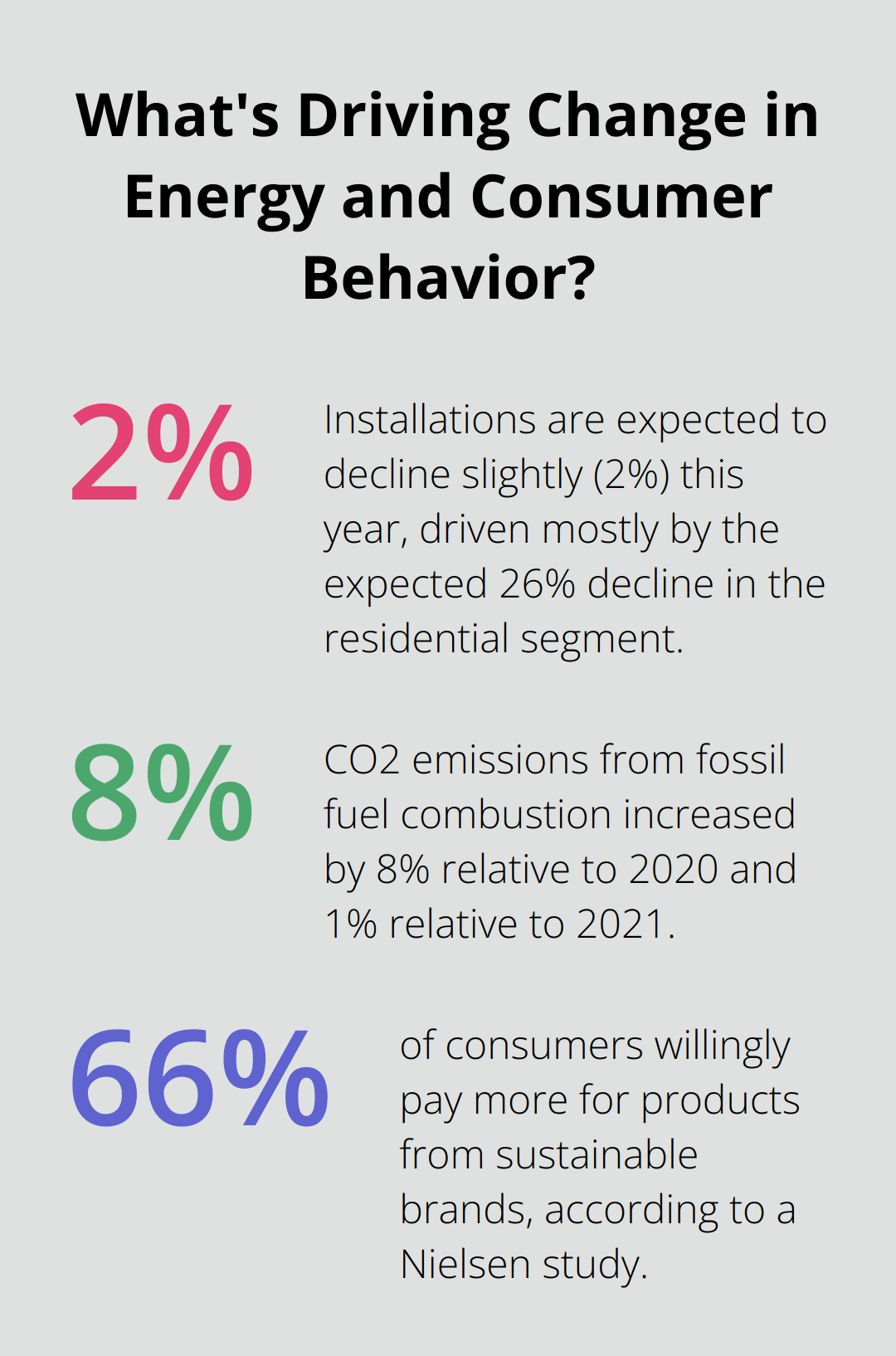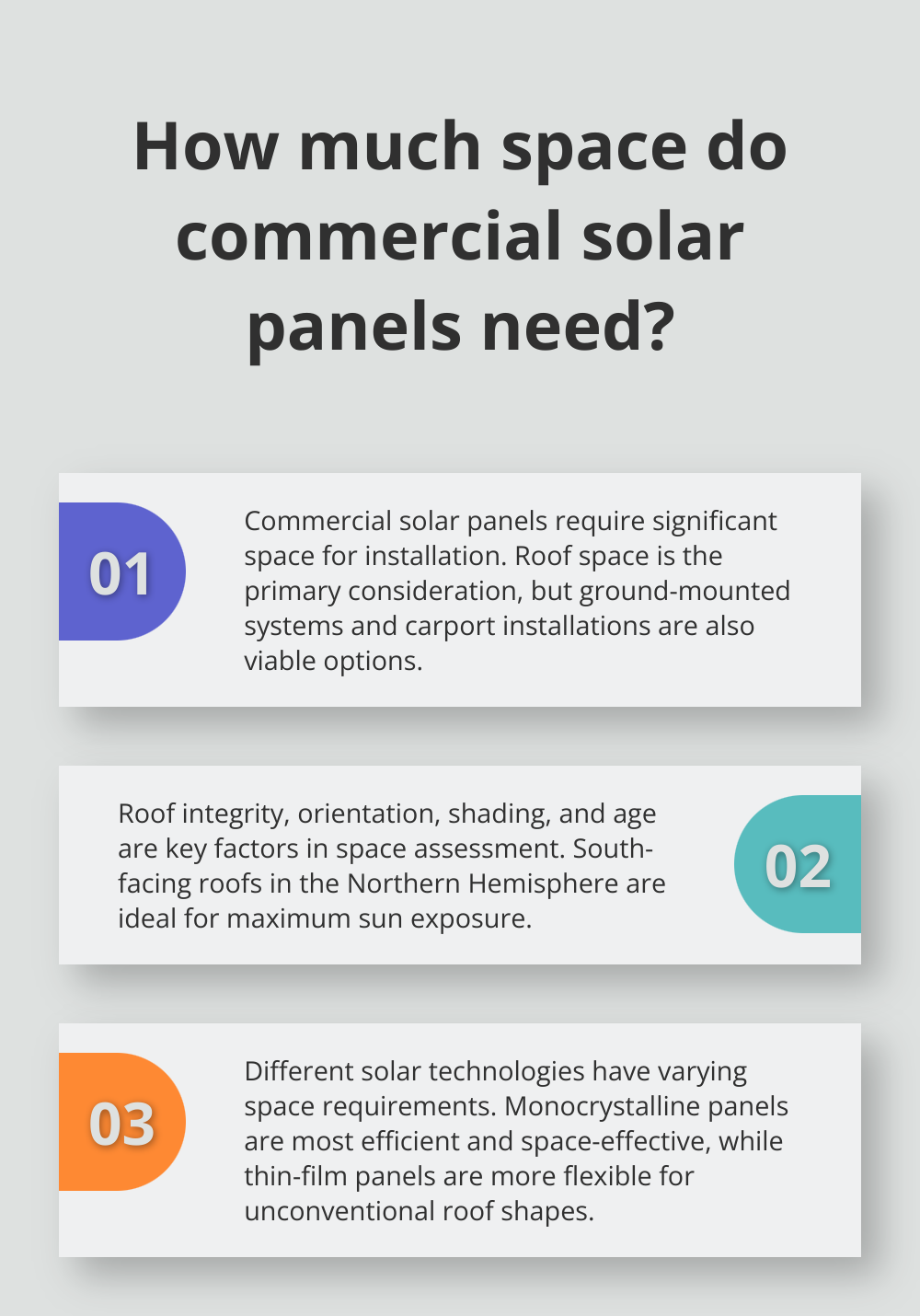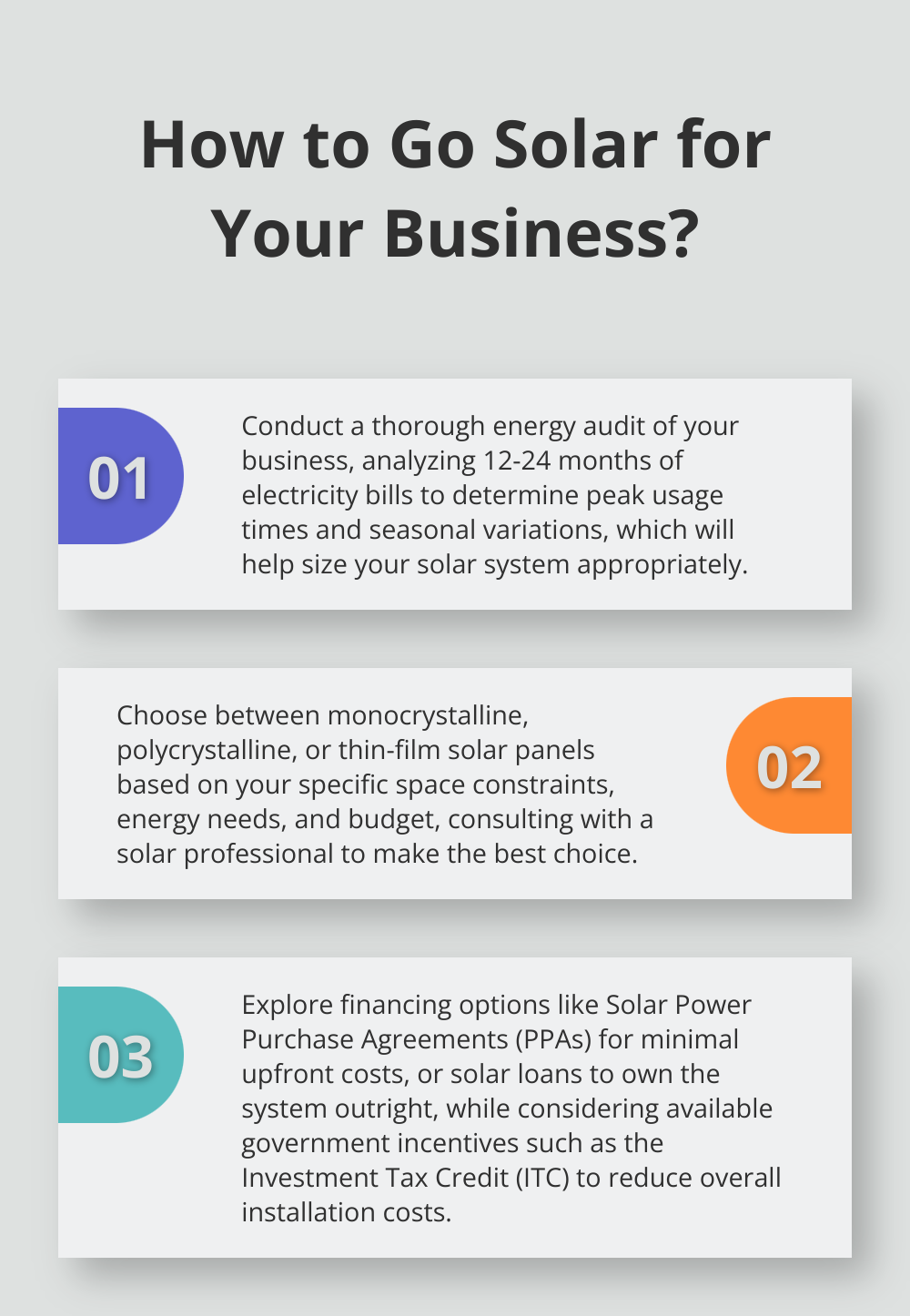Commercial solar panels are revolutionizing the way businesses power their operations. At Spinifex Energy, we’ve seen firsthand how the commercial use of solar panels can transform a company’s energy profile and bottom line.
These systems offer more than just cost savings; they’re a strategic investment in sustainability and corporate responsibility. In this post, we’ll explore the benefits, selection process, and financing options for commercial solar installations, helping you make an informed decision for your business.
Why Commercial Solar Panels Make Business Sense
Dramatic Reduction in Energy Costs
Commercial solar panels transform business operations by slashing electricity bills. Given the consistent upward pressure on business energy prices, every kilowatt hour of generated solar is now saving up to 60% more than it was only 5 years ago. Because of this, the long-term benefits of solar installations for businesses remain significant. These systems can accumulate substantial savings over two decades, revolutionizing a company’s financial outlook.
Environmental Impact That Matters
Commercial solar panels significantly reduce a business’s carbon footprint. CO2 emissions from fossil fuel combustion increased by 8% relative to 2020 and 1% relative to 2021. By adopting solar energy, businesses can help counteract this trend, meeting sustainability targets and complying with stricter environmental regulations. Solar adoption doesn’t just make businesses greener-it prepares them for future energy landscapes.
Boosting Brand Value Through Sustainability
Solar energy adoption serves as a powerful marketing tool. A Nielsen study found that 66% of consumers willingly pay more for products from sustainable brands. Visible investment in solar energy signals a commitment to sustainability to customers, partners, and employees. This commitment can increase customer loyalty, improve employee satisfaction, and attract environmentally conscious investors.
Enhanced Energy Independence
Solar panels provide businesses with greater energy independence. By generating their own power, companies reduce reliance on the grid and protect themselves against energy price volatility. This independence (coupled with potential battery storage solutions) can also ensure operations continue during grid outages, enhancing business resilience.
Long-Term Financial Benefits
The financial advantages of commercial solar extend beyond immediate energy savings. Many regions offer incentives, tax breaks, and rebates for solar installations. Additionally, solar panels can increase property values. The National Renewable Energy Laboratory found that buildings with solar installations sell for a premium (often 3-4% higher) compared to non-solar buildings.

As we move forward, it’s essential to understand how to select the right solar panel system for your specific business needs. The next section will guide you through this critical decision-making process.
How to Select the Ideal Commercial Solar System
Evaluate Your Energy Consumption
The first step in selecting a commercial solar system involves a thorough energy audit. This evaluation assesses your building’s energy use, identifies areas of inefficiency, and recommends energy-saving measures. Analyze your business’s electricity bills over the past 12-24 months to understand consumption patterns. Identify peak usage times, seasonal variations, and overall trends. This data will determine the size and capacity of the solar system you need.

Different businesses have varying energy needs. A manufacturing facility operating 24/7 will require a different system compared to a retail store open during standard business hours. Your energy audit should also account for any planned expansions or changes in operations that could affect future energy consumption.
Assess Your Available Space
The amount of usable space for solar panel installation is a key factor. Roof space is typically the primary consideration, but ground-mounted systems or carport installations can also be viable options. When evaluating roof space, consider:
- Structural integrity: Can your roof support the additional weight of solar panels?
- Orientation: North-facing roofs in the Southern Hemisphere are ideal for maximum sun exposure.
- Shading: Are there nearby structures or trees that could cast shadows on your panels?
- Age: If your roof needs replacement soon, it’s often more cost-effective to do so before installing solar panels.
A professional solar consultant can perform a detailed site assessment to determine the most efficient use of your available space.
Choose the Right Solar Technology
Commercial solar installations typically use one of three main types of solar panels:
- Monocrystalline panels: These are the most efficient and space-effective option (ideal for businesses with limited roof space).
- Polycrystalline panels: While slightly less efficient, these panels are more affordable and can be a good choice for larger installations.
- Thin-film panels: These are the least efficient but most flexible option, suitable for unconventional roof shapes or lightweight structures.
The choice between these technologies depends on your specific needs, budget, and space constraints. For instance, a data center with high energy demands and limited roof space might opt for high-efficiency monocrystalline panels, while a large warehouse with ample roof area could find polycrystalline panels more cost-effective.
Seek Professional Guidance
Navigating the complexities of commercial solar installations requires expertise. Working with experienced solar energy consultants can make a significant difference in the success of your project. These professionals can:
- Conduct detailed site assessments and energy audits
- Design a system tailored to your specific needs and constraints
- Navigate local regulations and permitting processes
- Identify and apply for available incentives and rebates
- Oversee installation and ensure quality control
A data-driven approach ensures that your solar investment aligns with your long-term financial and sustainability goals.
Future-Proof Your Solar Investment
When selecting a commercial solar system, think beyond your current needs. Consider factors like:
- Scalability: Can the system expand if your energy demands increase?
- Technology advancements: How easily can newer, more efficient panels integrate into your system in the future?
- Energy storage: Is the system compatible with battery storage solutions that might become more viable in the coming years?
A scalable solar installation ensures that your initial investment remains relevant and effective as your company’s energy demands increase.
As you move forward with your commercial solar project, it’s important to understand the various financing options available. The next section will explore these options in detail, helping you make an informed decision about how to fund your solar installation.
How to Finance Your Commercial Solar Installation
Solar Power Purchase Agreements (PPAs)
Solar PPAs offer businesses a path to solar energy without significant upfront costs. A third-party developer installs, owns, and operates the solar system on your property. You purchase the electricity generated at a predetermined rate, typically lower than current utility rates.
PPAs provide several benefits:
- Minimal or no upfront costs
- Predictable electricity prices for 15-25 years
- No responsibility for system maintenance or repairs
However, PPAs mean you won’t own the system or qualify for tax incentives. It’s important to review PPA terms carefully, especially escalator clauses that might increase rates over time.
Solar Leases and Loans
Solar leases function similarly to PPAs but with fixed monthly payments instead of per-kWh charges. They’re an excellent option for businesses that want to avoid upfront costs while still benefiting from solar energy.
Solar loans allow you to own the system outright. Many financial institutions now offer specialized solar loans with competitive interest rates (typically between 4% and 8%).
When considering a solar loan, evaluate:
- Interest rates and loan terms
- Monthly payments vs. projected energy savings
- Eligibility for tax incentives and rebates
Government Incentives and Tax Benefits
The federal government offers a significant incentives via the Small-scale Technology Certificates (STC) for solar installations.
Many states and local governments offer additional incentives and grants. For example, Energy Efficiency Grants for Small and Medium Enterprises provides rebates for installing energy storage systems alongside solar panels.
These incentives can significantly reduce the overall cost of your solar installation. Most people will need to spend between $16,500 and $25,000 for solar panels, with the national average solar installation costing about $21,816.
Choosing the Right Financing Option
The best financing option for your business depends on various factors, including your cash flow, tax situation, and long-term energy goals. Consider working with an experienced energy consultant to navigate these options. They can provide a comprehensive analysis of your energy needs, potential savings, and the most suitable financing methods for your specific situation.
The goal is to create a long-term strategy that maximizes your energy savings and contributes to your business’s sustainability goals. With the right financing approach, your commercial solar installation can become a powerful asset, driving both environmental and financial benefits for years to come.
Final Thoughts
Commercial solar panels offer businesses a transformative opportunity to reduce energy costs, decrease carbon footprints, and enhance brand image. The commercial use of solar panels provides greater energy independence, protecting companies from volatile energy prices and potential grid disruptions. Various financing options, government incentives, and tax benefits make solar adoption increasingly attractive for companies of all sizes.

Navigating the complexities of commercial solar installations requires expertise. Spinifex Energy specializes in providing tailored energy consulting services to busy professionals and business managers. Our team’s expertise helps clients save money while promoting sustainability.
Professional guidance ensures businesses select the right solar system for their specific needs, maximize available incentives, and implement a solution that delivers optimal long-term benefits. This approach streamlines the adoption process and helps businesses avoid potential pitfalls. Commercial solar panels will play an increasingly vital role in the business landscape, offering a unique opportunity to align financial success with environmental stewardship.

